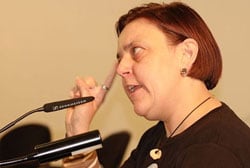We've all seen it happen - the stumbling over words, the awful hesitations and lost lines - making you squirm in your seat or simply wishing the speaker would disappear down a hole.
Why is it people fear public speaking so much?
Some people will go to the extent of avoiding public speaking altogether. Others will pass up promotions and assignments that require speaking. It may even lead some to choose a career that doesn't call for public speaking at all, rather than following the one they really want.
Others don't go that far, but will go to great lengths to avoid making presentations, or just speaking in a meeting. They may even deliberately arrive late, hoping to miss the customary introductions - "Hi, errr...I'm...ummm...John...The Gibbering Idiot."
The fear of being rejected - it's so strong that we're not only afraid of being ridiculed, laughed at, ashamed or judged; we're also afraid of being excluded from a social group.
Facing your fears

The more you prepare and practise, the more confident and better you will become when making a public address. (Image attribution:
Martina Nolte, Lizenz:
Commons by-sa-3.0 de, via Wikimedia Commons)
You have to remember that everyone gets a bit nervous. It's how you control your nerves
• Conquer uncertainty - the more uncertain you are, the more nervous you will be.
Fear of the unknown, uncertainty, that's what makes people panic. The more you can reduce uncertainty the less nervous you will be.
A few tips to help conquer uncertainty
1. Don't shoot in the dark - think about the purpose of your talk, your audience, the occasion. Talk to people, find out what they want you to present. Don't give a surprise presentation, it could backfire on you.
2. Be prepared - don't wing it. The more you prepare the more confident you will be, and the less nervous you will be. Begin preparing your talk at least three weeks ahead of time.
3. Give it structure - there are three parts to your talk or presentation; introduction, body and conclusion. Write an outline of your main points. This will give you a roadmap to follow before you are bogged down with finer details.
4. Don't memorise everything - you'll sound like a droning robot. A talk or presentation whether to 10 or 100 people must be spoken, not read or memorised. Write your presentation with your ear as well as your pen. Read it aloud as you write it. If it doesn't sound right, it usually isn't right.
5. Keep it short - some of the best talks I've ever heard have been short. It takes more work to write a short, tight talk or presentation than a long, rambling one. Cut, chop and edit. Make it tight, direct and to the point. Your audience will thank you for it.
6. Practise your presentation - record it and play it back. Listen to yourself. Re-edit your talk and record it again until you're satisfied. It will help you put the shine on your talk and make your words come naturally. Also, nothing will build your confidence as much as practice.
7. Keep up appearances - people judge you by the way you look. Some will decide before you've even opened your mouth whether they are going to listen to you. The way you look, the way you hold yourself, your presence (or lack of it), all play a vital role. Pay attention to your appearance, it will help you build your confidence.
8. Calm yourself - knowing you've done most of the work already will help you over come some of your nerves. The rest is confidence and a sense of authority. Stop thinking about yourself and your fears, remember that the audience wants you to succeed.
9. Get approval - approval is what we all want when presenting and we're afraid we won't get it. That's what makes us nervous. Just before you start talking, pause, make eye contact, and smile. Nothing will relax you and your audience more. You'll gain a sense of approval and it will give you time to relax and get in control.
10. Start strong - your opening must be totally eyes-up. You want to sound calm and at ease, with a sense of joy to be there. You'll see your audience visibly relax as they realise have what it takes to make a good presentation, which in turn will relax you.
Remember, every great speaker started out as a poor one. What made them a success was their willingness to take a chance, try again, and view every opportunity as a step to becoming a better speaker.
Regardless of your profession, your success is determined a great deal by your ability to communicate effectively. Whether you're running a meeting, selling a product, motivating co-workers or just communicating one-on-one with others, you'll get far better results if you can present your thoughts persuasively, smoothly and logically.





















































